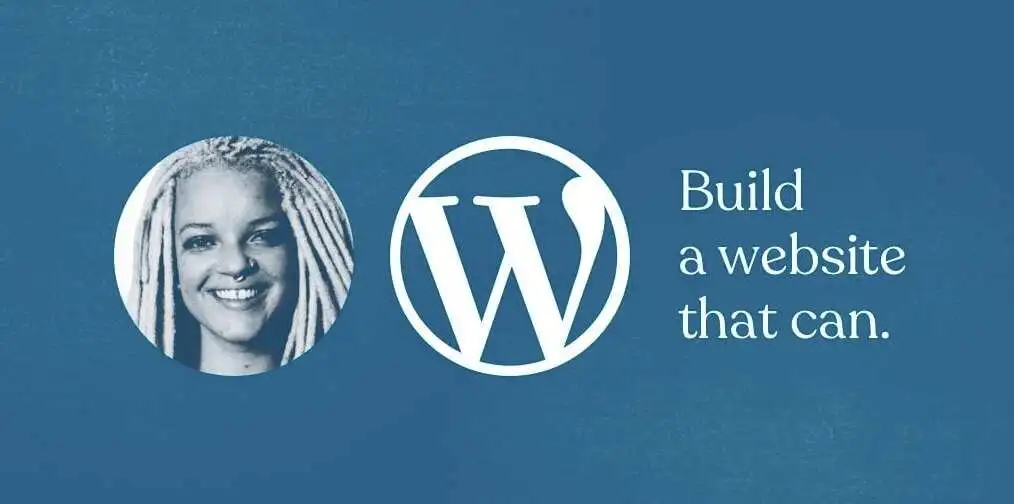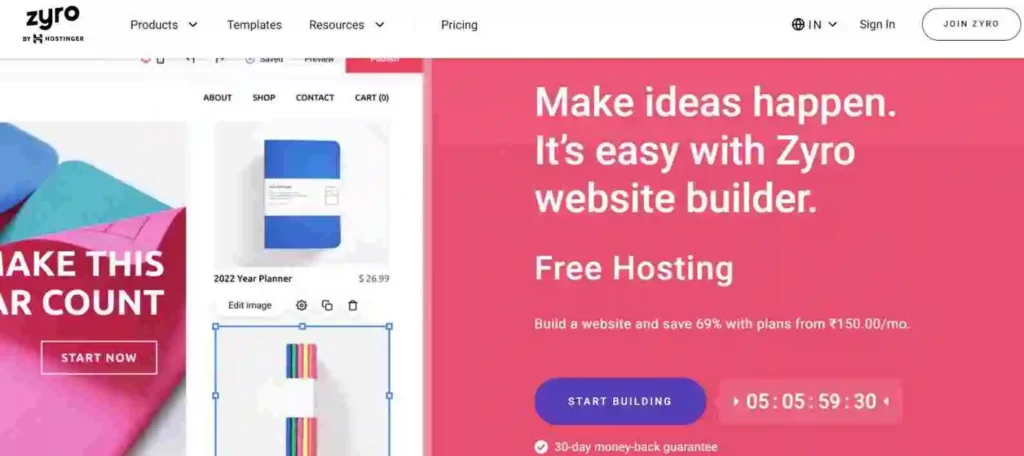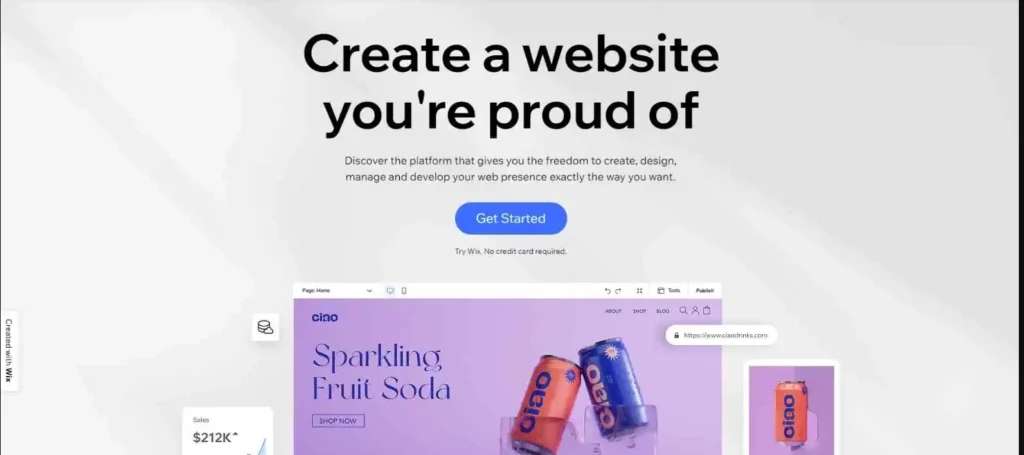Whether you’re a small company owner, an artist, a photographer, a writer, or a consultant, there is a website builder for you—and you don’t need to know how to code.
The days of needing a web developer with coding abilities to create a simple and professional-looking website are over.
Additionally, you do not need a lot of time or money to establish a nice website. Squarespace, Wix, and other popular website builders make it straightforward for even the most inexperienced user to rapidly set up a presentable website, even when more complicated capabilities such as email marketing or an eCommerce website are required.
Choosing the finest website builder is highly dependent on your unique requirements.
There are several possibilities, and combing through all of the free options for a basic website and all of the e-commerce website builders for a more complex commercial website may be daunting.
Due to the industry’s complexity and expansion, you now have more options than ever before and can simply pick the finest website builder for your specific goals and requirements.
While it is true that a few favorites have emerged—and these are often an excellent place to start—even the front-runners are not optimally suited to every situation.
To make it easy for you, we’ve compiled all of the information you’ll need to make an informed choice about the best website builder, allowing you to focus on the fun part of creating your professional website.
Several variables were evaluated, including the builder’s ability to customize, eCommerce features, marketing tools, and an SEO tool. Additionally, we evaluated the company’s customer service and eCommerce functionality.
So, let us check out the list of the best website builders.
Contents
- 7 Best Website Builders in 2024
- 1. Squarespace:
- 2. WordPress.com:
- 3. Shopify:
- 4. BigCommerce:
- 5. Zyro by Hostinger:
- 6. WooCommerce:
- 7. Wix:
- How to Choose the Best Website Builder?
- Pricing Tricks To Choose Best Website Builders
- FAQs related to Best Website Builders
- 🤩 What platform are most websites built on?
- 👉 How much does it cost to build a website from scratch?
- 👍 How much does it cost to run a website monthly?
- 🙋♀️Can I build a website for free?
- 💁 Can I build my website?
- Conclusion- Best Website Builders In 2024
7 Best Website Builders in 2024
1. Squarespace:
Squarespace is a well-known professional website builder that is renowned for its beautiful designs and simplicity of use. Squarespace is used to build around 1.8 percent of all websites, according to W3Techs.
Squarespace’s hosting architecture is enterprise-grade. This safe and durable platform enables you to concentrate entirely on company growth rather than hosting.
Squarespace is pre-designed with a plethora of website templates. Each of these designs is fully customizable for any content. They are completely customizable, and Squarespace even enables you to utilize many designs on the same website simultaneously.
Adding content to your Squarespace website is a breeze. Point to a location on your website and begin typing. Drag and drop elements on pages to quickly build your layouts.
Additionally, Squarespace offers an eCommerce option that enables you to integrate an online shop with your website. It has a user-friendly interface for managing your items, inventory, orders, and coupon discounts, among other things.
Squarespace websites cost between $12 and $18 per month. Their internet storefronts are available for between $26 and $40 each month.
Squarespace is an elegantly designed platform with simple-to-use functionality. It’s ideal if you’re looking to rapidly develop a website.
2. WordPress.com:
Automattic operates WordPress.com, a blogging platform, and website hosting, provider. It was founded by Matt Mullenweg, co-founder of the open-source software WordPress, therefore the name WordPress.com.
To understand more, visit our article on the relationship between WordPress.com and WordPress.org.
WordPress.com is not synonymous with self-hosted WordPress.org, which we previously ranked as the best website builder. Rather than that, this is a bespoke hosting service geared at blogging.
WordPress.com is a website hosting provider based on the same WordPress software as WordPress.org, but with a completely customized user experience. You won’t need to bother about software or backups, since WordPress.com will take care of them for you.
Their free and premium subscriptions include a variety of distinct features. Each package includes access to hundreds of free and premium WordPress themes.
After that, you may use the built-in customizer to add your site’s title, include widgets, and build navigation menus, among other things.
It lacks the drag-and-drop capabilities seen in other website builders. To a certain degree, though, you may readily modify designs.
It does have robust editing capabilities that bloggers find quite useful.
The free plan on WordPress.com is quite restrictive. Their plan begins at $4 per month and includes a personalized domain. The premium subscription is $8 per month, invoiced yearly, and includes site monetization and comprehensive design customization.
However, to construct professional websites, you’ll need to subscribe to either their Business ($24 per month) or eCommerce ($45 per month) plans, which are much more costly than self-hosted WordPress.
3. Shopify:
Shopify is another prominent eCommerce website builder that was created with online businesses and eCommerce websites in mind.
It powers millions of e-commerce sites in 175 countries. Shopify’s technology has facilitated the sale of over 400 billion dollars worth of merchandise.
According to our professional analysis, Shopify is used by 4.4 percent of all websites on the internet as an eCommerce website builder.
Shopify is an all-in-one, fully hosted eCommerce platform, which eliminates the need for you to manage software, install upgrades, or maintain backups. Shopify takes care of everything for you.
It integrates a payment service known as Shopify Payments that enables you to take credit cards. Additionally, you may take payments using third-party payment platforms.
Shopify is an eCommerce website builder that includes complete inventory management, infinite goods, strong analytics, and simple marketing options all under one roof. They provide hundreds of styles and never need you to enter a code.
Shopify’s intuitive drag-and-drop interface makes it very simple to construct a fully functional online shop.
Additionally, they provide in-store point-of-sale (POS) software that enables you to sell items at your location while accepting all major credit cards and using Shopify’s inventory, shipping, marketing, and statistics management features.
Shopify’s entry-level subscription is $29 per month. For $79 per month, you can subscribe to Shopify, or for $299 per month, you may upgrade to Advanced Shopify. Shopify now provides a $9 per month Shopify Lite account, which enables you to add a purchase button to any website.
If you’re looking for an easy-to-use eCommerce website builder, Shopify may be the best solution for you.
4. BigCommerce:
BigCommerce is a popular eCommerce website builder that makes it simple to construct a scalable online shop. It has all the necessary features, allowing you to keep overhead low and margins high.
BigCommerce is a fully hosted eCommerce solution, which eliminates the need for you to worry about website performance, security, or upgrades. They take care of the server and technical aspects of your company, allowing you to concentrate on building your business.
Unlike other hosted eCommerce solutions, BigCommerce integrates natively with WordPress, allowing you to harness WordPress’s flexibility while using BigCommerce’s headless eCommerce capability.
In simple words, your website will remain fast and safe regardless of the number of visitors it receives.
BigCommerce works with all major payment gateways, including Stripe (for credit card and ACH transactions), Ayden, Chase PAy, Visa Checkout, Amazon Pay, Square, Apple Pay, PayPal, and a lot more.
In contrast to Shopify, BigCommerce does not charge a fee for using these payment methods.
You may begin with one of their several pre-built website templates and then personalize it to your specifications using their simple drag-and-drop website builder.
BigCommerce has several tools that help with conversion rate optimization, including cart abandonment, enhanced product search, product reviews, and discounts. You may link to third-party programs through their app store to get extra functionality.
OptinMonster’s BigCommerce app enables you to add customized messages and increase your eCommerce conversion rates.
The finest aspect is their dashboard, which displays key indicators to assist you in confidently growing your company.
All BigCommerce plans include a 15-day free trial. Their entry-level plans start at $29.95 a month and include all of the key features.
You may subscribe to the Plus plan for $79.95 per month if you want to make use of extra conversion optimization tools.
Their pro package is $299.95 per month and includes all the advanced capabilities you could require.
When compared to Shopify and other third-party eCommerce systems, the biggest feature of BigCommerce is its seamless connection with WordPress, which is a significant advantage if you want to combine the freedom of WordPress with the power of BigCommerce.
This is one of the reasons we rank BigCommerce so highly on our list of the top eCommerce website builders.
5. Zyro by Hostinger:
Zyro is the same company behind Hostinger’s powerful and economical website builder. They provide a simple drag-and-drop website builder together with free hosting.
This makes Zyro an excellent alternative for individuals seeking a low-cost website builder with which to get started.
Without any design or coding abilities, the Zyro website builder enables you to construct a website. Their simple-to-use but sophisticated design tools enable anybody to create aesthetically amazing websites.
It includes a logo creator, handy AI tools, and a slew of pre-built website layouts. Additionally, you receive free access to over 1 million high-quality photos.
The finest feature of Zyro is its reasonable cost. If you’re an artist or a small company operating on a shoestring budget, Zyro is your best option. Their unleased website building service is available for as little as $2.61 per month.
However, don’t let the inexpensive price fool you; this is a very capable website-building platform. They have a high rate of availability and dependability.
Each plan adds new, powerful features. On the Unleashed plan, for example, you get marketing connections like Google Analytics, Facebook retargeting, and visitor remarketing.
Additionally, they provide eCommerce subscriptions that include the ability to add an infinite number of goods, collect online payments, give discount coupons, manage orders and inventory, and even link your business to Amazon, Instagram, and Shopify.
Zyro’s Unleashed plan begins at $2.61 per month and includes a free domain. Their eCommerce package is $8.01 per month and allows you a maximum of 100 goods.
6. WooCommerce:
WooCommerce is the world’s most popular eCommerce website builder for launching an online shop. It is an open-source eCommerce platform based on the WordPress platform.
According to our professional analysis, WooCommerce powers 8.8% of all websites on the internet, making it twice as popular as Shopify.
Because WooCommerce allows you total control over your website, it is the finest website builder for eCommerce sites.
It has every feature imaginable for building a successful online business.
Additionally, they provide a plethora of extensions to assist you with shipping, delivery, fulfillment, sales tax administration, inventory management, and almost every other area of shop management.
You may use SeedProd to develop custom sales funnels and product landing pages, AffiliateWP to manage an affiliate program, TrustPulse to display real-time social proof, Advanced Coupons to give free shipping or BOGO discounts, and WholeSale suite to establish unique wholesale rates, among other things.
WooCommerce integrates effortlessly with all major email marketing providers, analytics systems, live chat applications, help desk applications, and conversion optimization tools.
You can decrease cart abandonment and increase sales conversions by incorporating gamification using the OptinMonster WooCommerce plugin.
Apart from that, WooCommerce is incredibly SEO friendly, and the AIO SEO plugin may help you further optimize your eCommerce SEO.
The level of freedom and customization that WooCommerce provides is unfathomable.
For the reasons outlined above, our experts rank WooCommerce as the finest eCommerce website builder.
While WooCommerce is a free eCommerce website builder, you will need to purchase a domain name and web hosting to launch your online shop.
This fee will vary depending on the volume of visitors and the popularity of your website.
SiteGround’s Startup Plan starts at $3.99 per month and includes WooCommerce pre-installed, a free SSL certificate, daily website backups, a free CDN, auto-updates, and better security.
Alternatively, you may utilize Bluehost’s premium WooCommerce plan, which costs $32.95 per month and includes many premium WooCommerce extensions like subscriptions, online booking & appointments, and other premium features (all of which are individually priced at over $1000).
Owners of very popular WooCommerce sites often use WP Engine’s managed WooCommerce hosting, which begins at $30 per month.
7. Wix:
Wix.com is another well-known cloud-based website builder. It combines the simplicity of use with a robust collection of features to allow you to design your website quickly. Wix is the website builder of choice for over 1.9 percent of all websites.
Wix is a completely hosted platform, which means you will not be charged for hosting. You have access to hundreds of website design templates from which to pick.
Each template is completely modifiable using the site builder’s straightforward drag-and-drop interface.
Additionally, Wix has developed an artificial design intelligence (Wix ADI) that can create a stunning website for you.
Apart from a plethora of layouts, Wix has a slew of free and paid applications that you may integrate into your website.
These applications enable you to extend the functionality and features of your website. Some are developed by Wix, while others are developed by third-party developers.
Wix provides a free subscription with restricted storage and bandwidth. This subscription, however, allows you to try out their drag-and-drop website builder.
Because it does not include a domain name, you may wish to switch to a premium plan if you want to retain your website.
Additionally, all Wix plans include a free SSL certificate, but you must activate it for your website.
Wix provides a limited-time free edition that includes a Wix-branded subdomain. For $9.16 a month, you can connect a domain.
Their combination package begins at $14 per month and includes a free domain name. eCommerce plans start at $23 per month for online shops.
How to Choose the Best Website Builder?
Given the abundance of possibilities and the fact that many website builders prevent you from picking up and moving afterward, it’s critical to join the fight with a clear understanding of what you want.
By setting your objectives and direction initially, it will be simpler to match the finest website builder to your needs and prevent buyer’s remorse down the line.
In terms of cost, the majority of builders provide between two and four distinct price levels, each with its own unique set of features.
This may make comparing services more difficult since they do not make it simple to compare apples to apples, but this is one of the primary reasons we produced this useful guide!
In general, an individual website may be constructed for roughly $8 to $10 per month with an annual membership.
The majority of e-commerce subscriptions cost between $20 and $25 per month, but if you want an enterprise-style plan with numerous editors and VIP-level assistance, premium options may cost up to $300 per month.
While storage and bandwidth are often unrestricted, there are certain outliers, such as Wix, which restricts storage capacity based on plan tier.
Even its entry-level plan includes a respectable quantity of data (3GB of storage and enough bandwidth to support up to around 5,000 visitors per month).
After addressing the major concerns like cost and storage, determining the best website builder comes down to what you’re looking for.
The following questions will help you determine if you’re prepared to shop like an expert and choose the finest website builder for your requirements.
🤩 What platform are most websites built on?
WordPress. WordPress.org (affectionately referred to as self-hosted WordPress) is the world's most popular website creation platform. WordPress powers about 43% of all websites on the internet.
👉 How much does it cost to build a website from scratch?
A simple website for a small company might cost between $100 and $500 to develop. However, this cost may grow depending on your objectives. A custom-built website with a large number of features might cost upwards of $30,000 or more. To begin, you'll need a domain name and web hosting for your company website.
👍 How much does it cost to run a website monthly?
On average, though, you may anticipate paying roughly $200 upfront and around $50 each month to maintain a website. This estimate increases if you hire a designer or developer – anticipate an upfront cost of around $6,000, followed by an annual fee of $1,000.
🙋♀️Can I build a website for free?
While you may create a website for free, there are some caveats. On website builders, free accounts are missing a slew of critical functionality. Custom domains are not supported, and your free site will have advertisements for the website builder. If you're interested in learning more about website creation, the free choices are worth considering.
💁 Can I build my website?
You may either pay someone to design and create a website for you or do it yourself (if you're a beginner, The Best Courses for Learning How to Build Websites is a good place to start). You may develop web pages online or offline using a desktop software program.
Quick Links
Conclusion- Best Website Builders In 2024
You’ve now seen our roundup of the top website builders available, and perhaps you’ve gained a better understanding of which builders are most suited to your specific requirements.
All of our suggestions are based on extensive research and input from real people like you – they are not made up on the spot – so you can be certain that the information in this article is true and fair.
As you can see from our comparison table, each website builder offers distinct advantages. Whether you’re looking for a cutting-edge, attractive website, exceptional pricing, or even a helpful hand, there is a builder for you out there.
So, it’s entirely up to you now.








